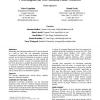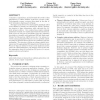112 search results - page 19 / 23 » Argumentation as a Social Computing Paradigm |
CHI
2003
ACM
14 years 8 months ago
2003
ACM
Historically, the dominant paradigm in HCI, when it appeared as a field in early 80s, was information processing ("cognitivist") psychology. In recent decades, as the fo...
JUCS
2008
13 years 8 months ago
2008
: So far, the Ambient Intelligence (AmI) paradigm has been applied to the development of a great variety of real systems. They use advanced technologies such as ubiquitous computin...
IACR
2011
12 years 8 months ago
2011
Companies, organizations, and individuals often wish to share information to realize valuable social and economic goals. Unfortunately, privacy concerns often stand in the way of ...
TLDI
2009
ACM
14 years 5 months ago
2009
ACM
The importance of distributed systems is growing as computing devices become ubiquitous and bandwidth becomes plentiful. Concurrency and distribution pose algorithmic and implemen...
POPL
1989
ACM
14 years 14 days ago
1989
ACM
raction that a programming language provides influences the structure and algorithmic complexity of the resulting programs: just imagine creating an artificial intelligence engine ...



